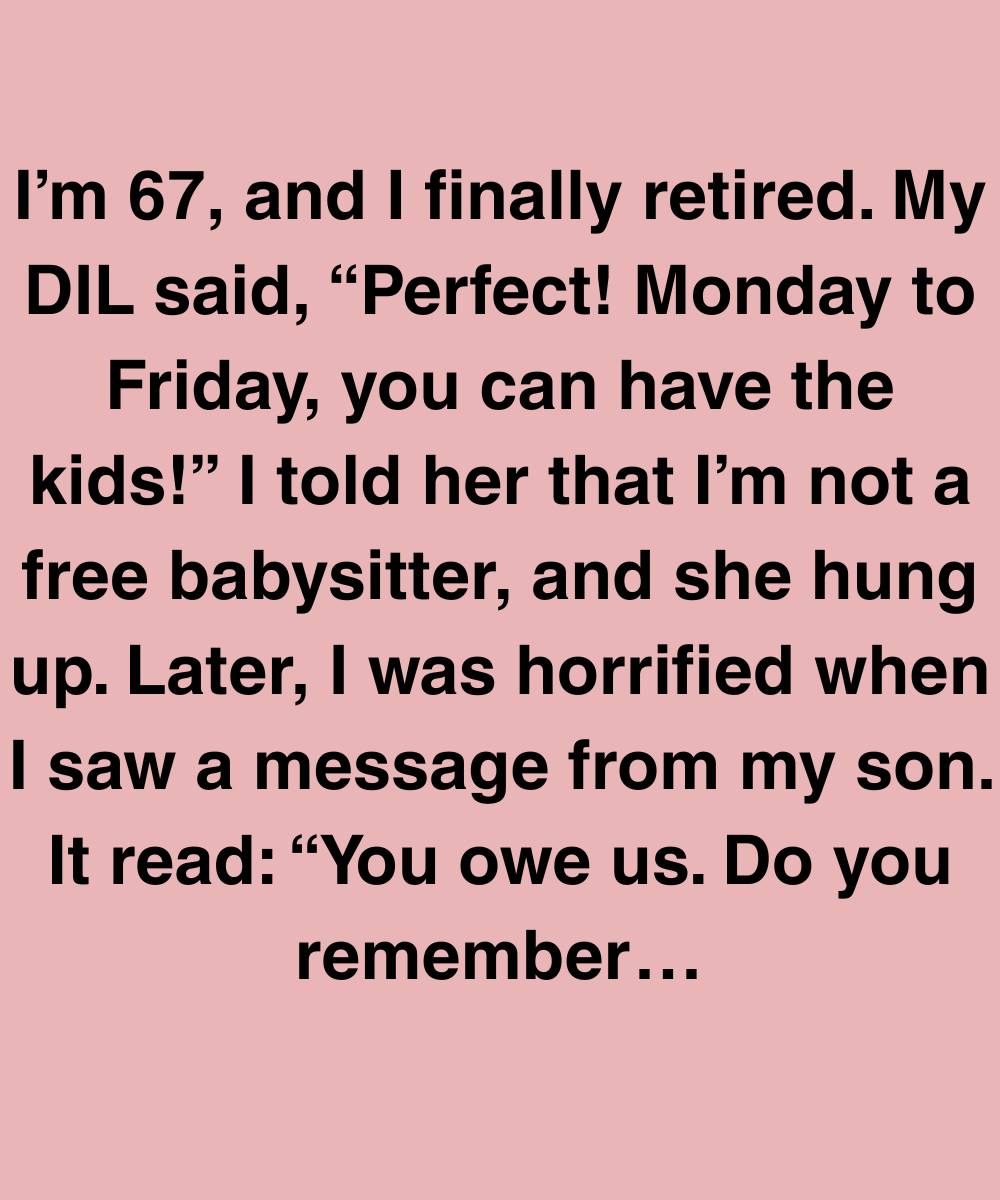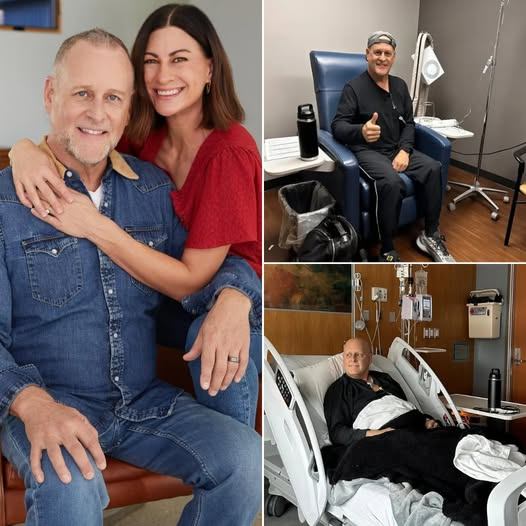
I’m 67, and I finally retired. My daughter-in-law, Saira, smiled wide over the video call and said, “Perfect! Monday to Friday, you can have the kids!”
I blinked. Thought she was joking.
“I’m not a free babysitter,” I said lightly, laughing a little, but her face dropped instantly.
She just said, “Wow,” and hung up.
I sat there stunned for a few seconds. Then my phone buzzed. It was a message from my son, Mahir.
“You owe us. Do you remember who helped you after Dad died?”
That single sentence flipped everything upside down.
I read it again. My hands started shaking.
I stared out the kitchen window, and for a minute, all I could see was the past.
My husband, Haroon, passed when I was just 42. He had a heart attack on the train coming home from work. One second he was fine, the next… gone.
Mahir was only 16 then. I had no real savings, just a tiny life insurance payout and a half-paid mortgage. I worked at the grocery store in the mornings and cleaned offices in the evenings. Every day felt like crawling uphill with a broken leg.
Yes, Mahir helped. He gave up college. Got a job at a warehouse, came home every night exhausted, and still managed to shovel snow, mow the lawn, even help his younger sister with her homework. I never forgot that.
But I also remember the way I used to put away extra soup for him in a thermos, even if it meant skipping lunch. I remember hiding overdue bills so he wouldn’t worry. We both gave up a lot.
So to see him write “you owe us”—like love is a ledger to be balanced—broke my heart.
That night, I didn’t sleep.
I sat on the couch, blanket wrapped around my legs, replaying every moment I thought we were close. Every birthday cake I baked, every time I picked him up from a broken-hearted breakup, or took care of his dog when he and Saira went traveling.
And now? Now I was just a solution to their daycare problem.
The next morning, I made some tea and called him. No answer. I called again. Voicemail.
By the third try, I left a message. “Mahir, we need to talk. Please come by. Alone.”
He showed up that evening, tight-jawed, shoulders stiff. Didn’t even sit.
“You don’t want to help with the kids. Fine. But don’t act like you’re above it. You owe us.”
There it was again.
“I didn’t raise you to throw guilt around like confetti,” I said, standing slowly. My knees ached a bit, but I held my ground. “Yes, you helped me. But I didn’t force you. You were my son, and you chose to help. Just like I chose to raise you without ever calling it a debt.”
He looked at me, eyes wide. “You always make it about your sacrifices—”
I held up a hand.
“No. I’m not here to fight. I’m just trying to understand how we got here. When did love become an invoice?”
He softened, just a little.
Then I said something I hadn’t planned: “What if I agreed to help, just two days a week?”
He frowned. “What?”
“I’m retired, not dead. I want to enjoy these years, see friends, travel maybe. But I do want to know my grandkids. I just don’t want to be taken for granted.”
He stood quietly for a long time. Then, almost in a whisper, he said, “It’s not about the kids. Saira’s job is hanging by a thread. Mine too. We can’t afford full-time daycare. We’re drowning, Ma.”
That hit me like a wave.
Not because I hadn’t guessed it—but because I’d been so focused on what I heard that I hadn’t thought about what he didn’t say.
I gestured to the couch. He finally sat.
For the next hour, he opened up. Turns out, they were three months behind on rent. The kids had outgrown their clothes, but they were stretching it. Saira had taken on two freelance gigs just to keep things afloat, and every penny was being poured into keeping the lights on.
And suddenly, the “you owe us” made a different kind of sense. Not moral, not fair—but desperate.
It didn’t excuse it. But it explained it.
We came up with a plan.
Two days with me. One day with a neighbor they trusted. The other two? They’d rearrange shifts and take turns.
“I’ll cook a little extra each week,” I added, “you can come pick up some meals.”
He nodded, eyes glassy.
“You should’ve just told me,” I said.
He smiled faintly. “I was too ashamed.”
The following week, Saira dropped off the kids—Arun and little Zoya. She barely met my eyes, but I invited her in for tea anyway.
She sat stiffly, clearly expecting a lecture.
“I’m not angry,” I said gently. “But we need to talk like family, not like coworkers negotiating hours.”
She blinked fast, then covered her face. “I just… we didn’t know how to ask for help.”
“I get that,” I said. “But you can’t treat help like an obligation. That’s how families fall apart.”
From that day, something shifted.
Not magically, not all at once. But slowly.
Arun and I planted tomatoes in the backyard. Zoya learned to say “Nana” and insisted on helping me fold laundry, even though she mostly just wore socks on her hands and laughed.
Saira started calling me just to chat. Once, she even dropped off dinner—her grandmother’s recipe. Mahir helped fix my leaky faucet without me asking.
One afternoon, I was resting in the yard when Arun ran up with a drawing. “It’s you and me!” he said proudly.
I looked at it—two stick figures, one small and one round, both smiling under a sun with a happy face.
And I felt… peace.
Weeks passed. Months.
Then one evening, something unexpected happened.
I was out for dinner with my old friend Rehana when she mentioned a part-time job opening at the community center.
“They need someone to help teach basic cooking and budgeting to young families,” she said. “You’d be perfect.”
I hesitated. I hadn’t imagined going back to work—even part-time.
But something about it excited me.
I applied. Got it.
Told Mahir and Saira over dinner.
They looked stunned.
“You’re working?” Saira asked, almost guiltily.
“I want to,” I smiled. “And it means I’ll be cutting back on babysitting to one day a week.”
Saira looked worried, but Mahir just nodded. “We’ll manage.”
But then something beautiful happened.
Saira’s freelance work started to grow. Her articles got picked up. She was offered a regular column. And Mahir? He was offered a supervisor role at the warehouse, with better pay and more stable hours.
They figured out a new routine. And I? I found new energy.
Helping young families, sharing what I’d learned through struggle, it gave me purpose. Meaning.
One day, a young woman in my class broke down crying. “I don’t have anyone,” she said.
I reached over, squeezed her hand.
“You do now.”
Sometimes, life rewards you in strange, quiet ways.
Not through money or applause, but through the quiet knowing that you mattered.
One year later, Mahir invited me to a dinner they hosted. Their new place—a little bigger, brighter. Saira had even framed a photo of the kids and me in the entryway.
At the table, Mahir raised a glass.
“To the woman who taught me that love isn’t a transaction—it’s a gift. Thank you, Ma.”
I swallowed hard.
Not because I needed the praise.
But because I never thought I’d hear him say that.
So here’s what I’ll say to you, if you’re still reading:
Boundaries matter. But so does compassion.
Sometimes people lash out not because they’re selfish—but because they’re scared.
Help, when you can, without letting yourself be used.
But more than anything: talk. Really talk.
Love shouldn’t come with receipts.
But it does come full circle, when we lead with grace.
If this story meant something to you, share it with someone who needs a reminder that even strained families can heal—with honesty, respect, and a little bit of patience.
👇 Like and share if you believe family doesn’t have to be perfect to be worth fighting for.



